Thu 10 Jun 2010
A Review by David L. Vineyard: GAVIN LYALL – Midnight Plus One.
Posted by Steve under Reviews[16] Comments
GAVIN LYALL – Midnight Plus One. Hodder & Stoughton, UK, hardcover, 1965. Charles Scribners Sons, US, hardcover, 1965. Paperback reprints include: Pan, UK, 1967; Dell, US, 1969; Orion, UK, 2005.
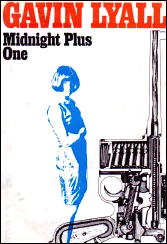
It’s a cold wet April in Paris, and Lewis Cane is nursing a drink in a small cafe when he is suddenly thrust into his own violent past.
Ask me what my wartime code-name was and I’d need a moment to remember. Broadcast it over a café loudspeaker in Paris and I know immediately who you mean. The back of my neck felt cold, as if somebody had touched it with a gun muzzle.
Cane, Caneton was a gunman working with the Resistance. He has old friends and old enemies, but luckily this is a friend, Parisian lawyer Henry Merlin and one time Resistance paymaster. The two men haven’t seen each other since the war, but it is no simple meeting.
Like Cane Merlin is involved in the scheme to get a man named Maganhard from a boat off the coast of Brittany to Lichenstein, where he is to accomplish a dicey bit of business. A simple job as Merlin describes it: “A client wishes to go from Brittany to Liechtenstein. Others wish him not to go. Shooting is possible. You wish to help him get there?”
Maganhard has been framed on a rape charge to delay him getting to Lichenstein for his tricky bit of banking so both police and his enemies want to stop him. Cane will have to take him across country by car.
Cane takes the job and learns he will not be alone, a young American gunman is going with him. Cane’s job is primarily as the driver and to back the American gunman; Harvey Lovell, the third best in Europe, an ex-agent of the American Secret Service.
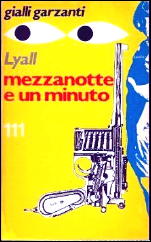
But Lovell comes with baggage Cane doesn’t need:
I grabbed for a cigarette. Maybe I was imagining things. I hoped so: I wanted a sensitive gunman as much as I wanted one with two tin hands.
Part of the fun of any Lyall novel is his considerable know how about guns and the business of guns. He neither romanticizes nor fantasizes about them, but presents them as tools in a deadly game.
And in Lyall’s sure hand even inanimate objects can become characters:
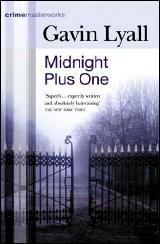
Maganhard is accompanied by his secretary Helen Jarmian, and Englishwoman, and she and Lovell are soon drawn to each other in the increasingly dangerous journey through the cold wet French spring.
It soon becomes obvious why Lovell has that haunted look. He has a problem with drinking, a bad habit for anyone, but fatal for a gunman.
Cane finds himself with a dipso gunman, a dubious client, a cranky car, and a woman on a job that would be difficult enough in any case. And the enemy has already shown its hand, murdering the driver that delivered the car.
The journey is dangerous and tense, and soon enough explodes in violence. Violence that pushes Lovell back to the bottle at the worst time.
He turned his head slowly and looked at me. His face was blank — as blank as his face could ever be. It was still a face that would know hell when it saw it, but it didn’t show what it knew now.
Except that I could guess. I said: “You need a drink.”
He looked at his spread fingers again, with no more emotion than if he was deciding he needed a manicure. Then he said slowly and simply: “Yes. I’m afraid I need just that.”
But Lovell manages to prove himself an efficient killer even drunk. And worse, the game isn’t as simple as it might seem and as Caneton knew, even if Cane may have forgotten, nothing is ever clean and simple in this violent world, and men play both ends against the middle with the dead bodies collateral damage.
Nor can Cane get around who he is — or was, and as the violent conclusion draws near he finds he can’t just walk away, because of who he once was and what that meant:
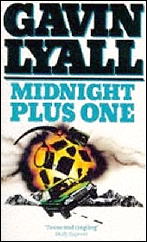
Slowly, very slowly, I lifted my left wrist and laid it across the barrel of the aimed gun and flickered my eyes for an instant at the luminous dial of my watch.
Three minutes. Just time to go back, to say the hell with twelve thousand francs and being Caneton. To tell Maganhard he’ll still be in the right whether he gets through or not, and that what matters is the cost…
But still time enough to fix the cost, to make that right. Because it was still the fight I’d planned and not what Alain was expecting. Because I was still Caneton — and nobody else was that. And I could get round that corner.
The ending is dark and powerful. Lovell has learned he can kill and drink, and Helen Jarmian who loves him, loves him too much to see how deadly that will be for them both. It’s the sort of thing Caneton alone can resolve.
I said: “How’re the shakes?”
He stretched his right hand towards me, fingers spread.
They were as steady as carved stone. He smiled down at them.
I said: “Pretty good,” and then swung the Mauser over and down. I heard — and felt — the fingers crack.
It’s a stunning moment, no less to the characters than the reader:
“It was cheap, simple, a bit nasty,” I said dully. “What Caneton would have done. If I’d been somebody else maybe I’d’ve thought of something better. But I’m not.”
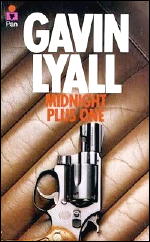
Harvey half opened his eyes and whispered hoarsely: “You’d better hide good, Cane. Real good. Because I’ll spend a long time looking.”
I nodded. “I’ll be at Clos Pinel — or they’ll know where.”
Somewhere between Ian Fleming and Raymond Chandler, Lyall is one of the masters of the British thriller, combining the poetry of the Buchan school with the action of Alistair MacLean and the toughness of a Hammett.
His books include classics of the form like The Most Dangerous Game, Shooting Script, The Venus Pistol and others, including the critically acclaimed Harry Maxim series.
I’ll grant I’m not the least objective about this book or Lyall. He is simply one of my all time favorites, and Midnight Plus One the best of his many books. I was sixteen when I first read it, and I’m happy to say it holds up as well today as it did then.
If you want to see the British thriller done as it should be by one of the best writers of that genre read this one. Read anything by Gavin Lyall. The man could not pen a bad book, and this one is his masterpiece.
Editorial Comments: According to Wikipedia, the film rights to Midnight Plus One were purchased by actor Steve McQueen not long before he died. If this is so, a great opportunity was lost — just my opinion, of course.
For a lengthy overview of Gavin Lyall and his work, and an abundance of cover images, check out Steve Holland’s Bear Alley blog. (Two of the cover images found here came from there.)
Steve’s essay, written in September of last year, ends by saying, “It’s sad to think that only one of Lyall’s novels (Midnight Plus One) is currently in print.” Has anything changed since then? I don’t believe so.
June 10th, 2010 at 8:49 pm
McQueen wasn’t who I had in mind while reading the book, but obviously this would have been perfect for him. Another of those ‘might have beens;’ all those ‘soon to be a major motion picture’ notices on paperbacks that never got made.
You have to wonder how many of them would have been better than some of the ones that did get made.
June 10th, 2010 at 9:58 pm
David
I think McQueen may have been too young for the role, but he’d certainly have done a bang-up job with it.
Now that it’s come up, I’ve been playing around with the idea of who I’d cast in the role. I have a picture of Cane in my mind, but it’s still only a vague one.
I think I’m influenced more by your review than by the book, which I read a long time ago, so I’ll let you go first, if you’re of a mind to?
— Steve
June 10th, 2010 at 10:30 pm
When I read the book at age sixteen (ouch) I had Cary Grant in mind as Cane, now it would be closer to a slightly older Michael Caine (older than he was at the time the book was written anyway).
As you say, McQueen was too young, but the role of the laid back but ruthless Cane would have been a good fit though if I was going to cast an American actor I would likely have gone with James Coburn at the time. I certainly see why McQueen saw himself in the role.
Though the film is a bit of a disappointment, Richard Fleisher’s THE LAST RUN (begun by John Huston) with George C. Scott, Tony Musante, and Trish Van der Vere has somethings in common with the basic story.
June 10th, 2010 at 10:46 pm
We’re on the same track, then. While I was waiting for your reply, I was doing some Serious Thinking. The two choices I came up with were Richard Burton or Michael Caine, with the disadvantage that both of them would have probably been unhappy about being typecast in playing that kind of role ever again.
Maybe I liked THE LAST RUN better than you, but now that you mention it, there certainly are some similarities. In fact, I think that’s the movie I had in somewhere in the back of my mind in Comment #2, but I never managed to pry it loose.
June 10th, 2010 at 11:05 pm
I liked THE LAST RUN, but it runs out of steam toward the end, and likely the difference is having to change directors in mid-stream — especially from Huston to Fleisher who are very different kinds of directors despite both having strong noir credentials and outstanding work overall.
I’m not sure this wouldn’t have been better served as a small British thriller than a big American production. In all honesty, reading the book I even envisioned it in black and white.
I’m just guessing, but I’d be willing to bet Lyall had someone closer to Humphrey Bogart in mind as Cane — maybe Trevor Howard (who played similar roles in THE CLOUDED YELLOW and THE GOLDEN SALAMANDER).
Burton would have been good as Cane. As for why Cary Grant, when I saw CHARADE at fourteen it had a big impact on me, and after seeing NORTH BY NORTHWEST and NOTORIOUS Grant just seemed a good fit — that, and John Robie from TO CATCH A THIEF and Cane here aren’t that far apart.
But with a story this strong quite a few actors from the period combined with the right director could have made a good fit here. All it needed was someone with the ability to convey Cane’s quiet savagery.
But today, hands down its a Harrison Ford role.
June 11th, 2010 at 5:41 am
The first Lyall I read, and it made me a fan. And yeah, I saw Michael Caine in the lead.
June 11th, 2010 at 12:11 pm
Thanks for including all the covers. So interesting to see how it is presented over time.
June 11th, 2010 at 12:50 pm
Patti
I wouldn’t do it if I didn’t agree!
— Steve
June 11th, 2010 at 4:37 pm
I like the Italian ‘giallo’ cover, though my favorite, the Dell paperback, isn’t shown. Funny that no one used that tunnel at the end. Maybe it was too Hitchcockian for them?
Many of the Brit paperback covers for Lyall were by Brit sf artist Chris Foss according to the article at Bear Alley.
I’ve always considered Lyall not only the best of the later Brit writers, but right up there with Household, Innes, and Canning, with ties to the classical period of Dornford Yates and Buchan. And he reinvented himself at least twice, going from the adventure school to the LeCarre style with his Maxim series, and again with a historical spy series as the Cold War petered out, and he did them all superbly.
June 11th, 2010 at 4:38 pm
Forgot to mention Harry Maxim made it to the small screen in the person of Charles Dance.
June 11th, 2010 at 8:49 pm
I found it on IMDB — THE SECRET SERVANT (1980) was made into a 3-part mini-series on BBC-TV in 1984.
It’s not included in Hubin’s CRIME FICTION IV, so I sent the information on to him. It will appear in the next online installment of the Addenda, I’m sure.
Is there any chance you’ve seen this, or is it something you’ve just happened to hear about?
— Steve
June 11th, 2010 at 9:02 pm
Sorry, wish I had seen it, just ran across it in something or other related to Lyall. Dance, however, was great casting for Maxim.
For anyone who likes the Le Carre school the Maxim books manage to do the whole thing with more style or humor than you’ll find in a dozen examples of Le Carre’s over written and sometimes painfully obtuse prose without sacrificing any of the cynicism or irony.
Sadly Lyall wasn’t particularly prolific since he insisted on seeing if many of the things in his books would actually work. He supposedly spent weeks experimenting casting his own bullets at his kitchen table to see if a scene in VENUS WITH PISTOL was plausible.
August 29th, 2010 at 1:06 am
A great review! You might be even more intrigued to know in the early 70s Orson Welles was supposed to write and direct a film adaptation of this book with Robert Mitchum, Jack Nicholson and possibly Yves Montand in the leading roles…It collapsed rather quickly tho it is not know if Welles got as far as a screenplay. I have heard he did.
August 29th, 2010 at 1:07 am
I have to check out his other novels!
February 28th, 2011 at 5:59 am
Good to read the superb review and all the comments. GL is my all time favourite author, I have all his books and, sadly, have to read them over and over again because GL is no more. I particularly enjoyed the ‘Matthew Ranklin/ Conall O’Gilroy’ series and only wish they could have carried on
November 17th, 2011 at 5:25 pm
I can’t remember when I red it, but I know I was really young am 35 now and its still my best book…beat all the chase series except knock knock who’s there. If in motion picture..daniel Craig as cane…shia labeouf as lovell. awesome review. love it. it brings back a lot of memories for me.